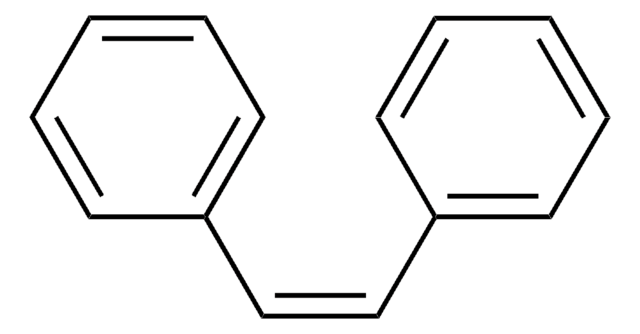161306
1,8-Nonadiyne
98%
Iniciar sesiónpara Ver la Fijación de precios por contrato y de la organización
About This Item
Fórmula lineal:
HC≡C(CH2)5C≡CH
Número de CAS:
Peso molecular:
120.19
EC Number:
MDL number:
UNSPSC Code:
12352100
PubChem Substance ID:
NACRES:
NA.22
Productos recomendados
Quality Level
assay
98%
form
liquid
refractive index
n20/D 1.449 (lit.)
bp
55-55.5 °C/13 mmHg (lit.)
mp
−21 °C (lit.)
density
0.799 g/mL at 25 °C (lit.)
storage temp.
2-8°C
SMILES string
C#CCCCCCC#C
InChI
1S/C9H12/c1-3-5-7-9-8-6-4-2/h1-2H,5-9H2
InChI key
DMOVPHYFYSASTC-UHFFFAOYSA-N
General description
1,8-Nonadiyne undergoes one-step hydrosilylation reaction for attaching acetylene-terminated alkyl monolayers to nonoxidized crystalline silicon surfaces.
Application
1,8-Nonadiyne was used as starting reagent in the synthesis of 2,6-hexadecadiynoic acid, 2,6-nonadecadiynoic acid and 2,9-hexadecadiynoic acid.
signalword
Warning
hcodes
Hazard Classifications
Eye Irrit. 2 - Flam. Liq. 3 - Skin Irrit. 2 - STOT SE 3
target_organs
Respiratory system
Storage Class
3 - Flammable liquids
wgk_germany
WGK 3
flash_point_f
107.6 °F - closed cup
flash_point_c
42 °C - closed cup
ppe
Eyeshields, Faceshields, Gloves, type ABEK (EN14387) respirator filter
Elija entre una de las versiones más recientes:
¿Ya tiene este producto?
Encuentre la documentación para los productos que ha comprado recientemente en la Biblioteca de documentos.
Stephen G Parker et al.
Nature communications, 9(1), 2288-2288 (2018-06-14)
For many normal and aberrant cell behaviours, it is important to understand the origin of cellular heterogeneity. Although powerful methods for studying cell heterogeneity have emerged, they are more suitable for common rather than rare cells. Exploring the heterogeneity of
Néstor M Carballeira et al.
Lipids, 41(5), 507-511 (2006-08-29)
The hitherto unknown 2,6-hexadecadiynoic acid, 2,6-nonadecadiynoic acid, and 2,9-hexadecadiynoic acid were synthesized in two steps and in 11-18% overall yields starting from either 1,5-hexadiyne or 1,8-nonadiyne. Among all the compounds 2,6-hexadecadiynoic acid displayed the best overall antifungal activity against both
Benjamin S Flavel et al.
Langmuir : the ACS journal of surfaces and colloids, 29(26), 8355-8362 (2013-06-25)
Poly(ethylene glycol) (PEG) is one of the most extensively studied antifouling coatings due to its ability to reduce protein adsorption and improve biocompatibility. Although the use of PEG for antifouling coatings is well established, the stability and density of PEG
Yan B Vogel et al.
Nature communications, 8(1), 2066-2066 (2017-12-14)
Predicting or manipulating charge-transfer at semiconductor interfaces, from molecular electronics to energy conversion, relies on knowledge generated from a kinetic analysis of the electrode process, as provided by cyclic voltammetry. Scientists and engineers encountering non-ideal shapes and positions in voltammograms
Janneke Veerbeek et al.
ACS applied materials & interfaces, 9(1), 413-421 (2016-12-10)
Silicon-based solar fuel devices require passivation for optimal performance yet at the same time need functionalization with (photo)catalysts for efficient solar fuel production. Here, we use molecular monolayers to enable electrical passivation and simultaneous functionalization of silicon-based solar cells. Organic
Nuestro equipo de científicos tiene experiencia en todas las áreas de investigación: Ciencias de la vida, Ciencia de los materiales, Síntesis química, Cromatografía, Analítica y muchas otras.
Póngase en contacto con el Servicio técnico








